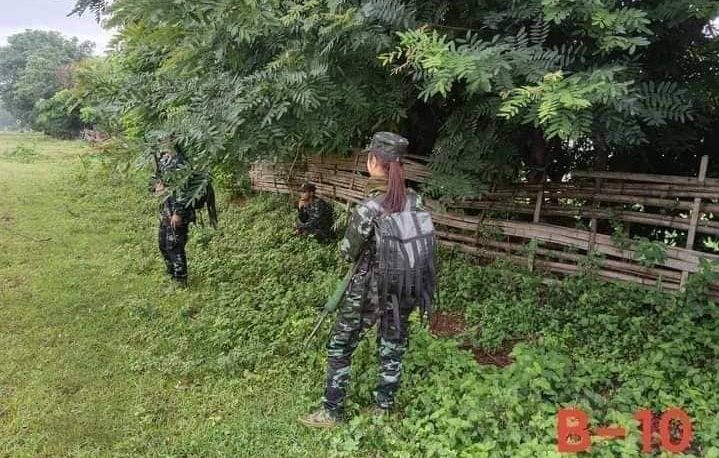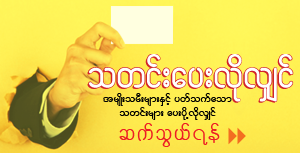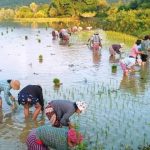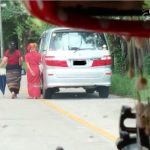The Courageous and Adventurous Female Supporter
Written by Shin Nyein and Translated by Ba Kyaw
A group of women was hurrying over the enormous rocks while carrying hefty sacks twice the size of their bodies in the heavy rain.
They don’t bring these hefty sacks to use. This food and supplies have been to support those who resist the SAC army’s offensive on the front line.
While these women were on their way to support their comrades, they were trapped in the forest for a night and two days due to the heavy fighting between the SAC army and the local defense forces after they heard the sound of mortar fire and gunfire.
A Shan woman in this group, Ms. Ei Poe, “We are sending food to the frontline soldiers. We encountered a battle on the way between other groups and SAC. We don’t have firearms. We think we are dead because no one to help us.”
The next day, Ms. Ei Po was able to get out of the battle with the help of the local defense force. Ms. Ei Poe and her team experienced trauma because they encountered a fierce.
They felt sorry for their comrades, who had been fighting for five days without food because their rations were late.
20 years old Ms. Ei Poe is a female supporter of a local defense force in Karen State who sends food and supplies to soldiers on the front lines.
In charge of Pearl People Defense Force at Sagaing told that frontline support work is so life-threatening that even a male soldier can’t do it, and it can be even more difficult for female soldiers.

He explained, “We only have men for supporting on the front lines. We don’t ask the girls that because it’s dangerous and only the brave can do it. Some of our comrades can’t do it because this work needs mentally and physically strong. If not, they can go crazy when they hear the sound of battle.”
There are numerous difficulties for female soldiers, such as avoiding the battles and military lines while assisting the front line, hardly going through the forest route due to the weather, and finding money to buy weapons.
In addition, being a woman, they have to bear the pain of monthly menstrual bleeding and continue to carry out their duties amid such dangers.
However, Ms. Ei Poe said, “The supporter duties may be a danger, but this is a revolution. Sometimes I couldn’t even stand up because of suffering the pain of my period. But, my responsibilities are crucial to winning the battle. Thus, I cannot stop working”
The case of Ms. Ei Poe clearly shows the level of difficulties for those women who take the role of a frontline support worker.
Ms. Ei Poe is from the southern Shan State, but she has been in Yangon for three years.
On the eighth day following the military coup, Ms. Ei Poe, who was the first to experience voting in the 2020 election, joined protests on the streets because she couldn’t accept the coup.
Then, Ms. Ei Poe has been assisting and following the frontline battlefields since she learned military skills for a month in an ethnic armed group in Karen State.
It will take the supporter two to three days to support, depending on how far the area is.
It is very rugged and rough for the supporter to transport food and supplies in Karen State, where the rivers and mountains are dense.
Ms. Ei Poe said, “I suffered from too much sweat in the summer. Also, I was injured in my whole body because hit by rocks during the rainy season. This time last year, I crossed the stream with a hefty rice sack. As soon as I arrived middle, the torrent of water heavily flew down from the hill. And I have washed away. I was lucky that I didn’t die.”
Additionally, she encountered the army column twice on the way and was questioned at the checkpoint. But she was released because she fearlessly gave suitable answers. She only got stuck in the middle of battle, but she was traumatized at once.
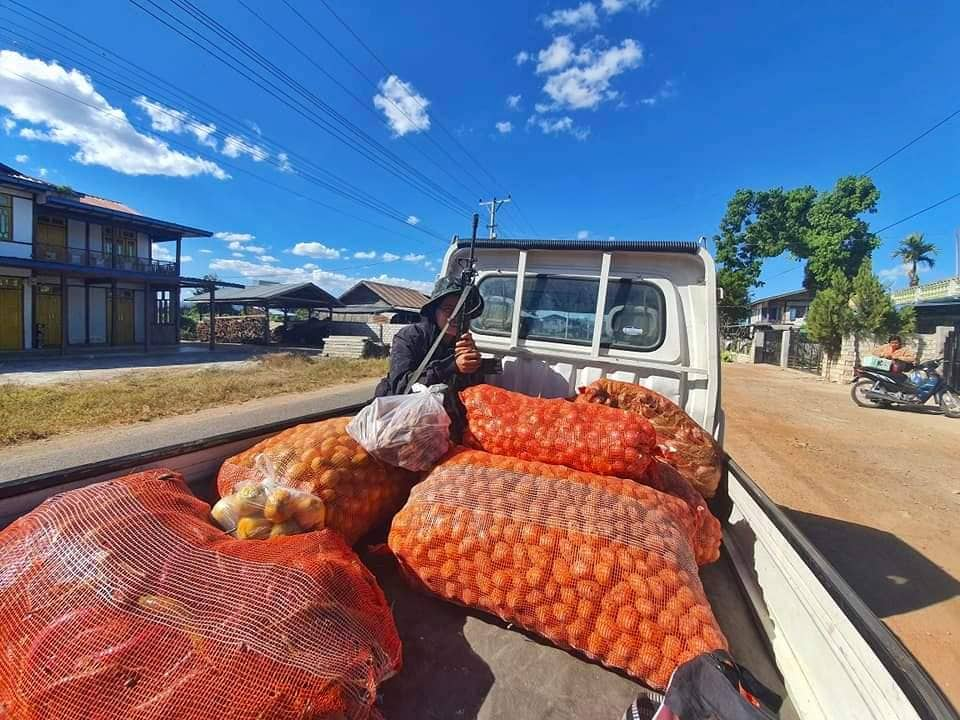
“I was still shocked when I talked about it. These are bad dreams, such as the sounds of bombs exploding, shooting, and approaching footsteps. Whenever I get stressed, I was dreamed back to it. I don’t know when trauma will ever go away” she said.
Ms. War Lay is also the local defense force supporter at Karenni, who faced life danger during supporting the frontline.
Ms. War Lay said, “I have experienced motorcycle accidents, car crashes, and sliding in the rain. I remembered that a car skidded off the road and fell into the water when going to support. At that time, I almost drowned.”
In addition, I had to flee alone with one piece of cloth because of coup army suddenly attacked their camp in the evening. I had to starve for months with no food and no place to live because the army burned our camp.
I solved this hunger with bamboo shoots and mushrooms from the forest. After this, we often moved around and did not have a specific camp.
Before the military d’etat coup, she worked as an intern at the Department of Agriculture of government. After the 8th day of the coup, she protested with the Department of Agriculture against the coup d’état. And then, she was disinherited by her family for participating in the revolution. After that, I joined the civil disobedience movement (CDM) and went to help the IDPs.
At the beginning of May, she joined the Karenni Regional Defense Force and attended military training. After completing the training, she worked as a female supporter for more than a year. During this period, she participated in the frontline battle twice.
“I slept in the forest for two nights. I fell down from the mountain, broke my hand, and minor injured my head. I have many memories. And all were suspense,” she said with a smile.
That it is difficult to carry the hefty sack on a forest trek. The individual below lifted it up after the individual above pulled it up. In this situation, she fell down with a hefty sack, broke her hand, and suffered minor head hurt.
That is more difficult to find donors than to fight on the frontlines, Ms. War Lay expressed opinion.
Because most of the local defense force totally depended on donors. They can’t fight without weapons and food supported by donors.
“We don’t have enough weapons and ammunition, and we can’t fight much. At that time, donors think we don’t work, then they don’t donate to us. It is like that phrase: crying baby always gets the milk. Those who can show their work get more support. We can’t reveal anything due to the situation,” she continued.
We were easy to collect food for our comrades, and we also donated to the IDP camps because we had many donors during the 1st year of the coup d’état. Now, the military is bombing with planes and firefights, and many donors are reduced.
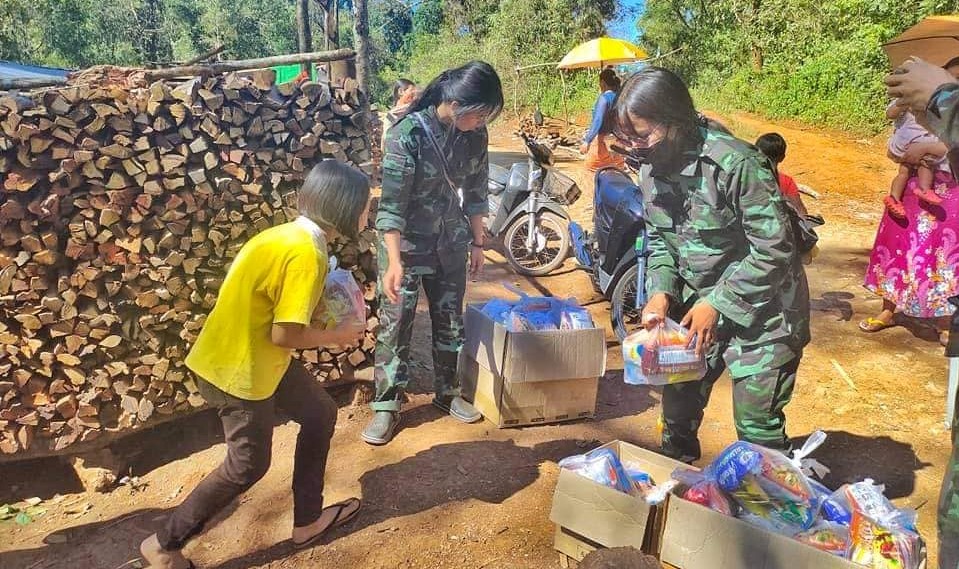
“Donors were no longer able to donate as before. Because they are concerned about the economic downturn, the rise in commodity prices, and many villages being burned by the army. At the beginning of the coup, we got about 50 lakhs a month. Now we didn’t get even two hundred thousand in the whole month,” she explained the situation.
Ms. Gracy is a female supporter of the local defense force Min Tut in Chin State, who is facing similar difficulties.
The roads in our area are terrible in the rain.
“I had to be stuck for about 5 days with no food and no place to live because of the landslide. I had non-stop walking for 4 days because of muddy. I was left hanging on the tree after the landslide.”
23 years old Ms. Gracy joined the armed revolution around June while participating in protests after the military coup. After attending military training for 3 months, she joined as a supporter for the frontline at the camp where she was assigned.
“We can evasive to the army column. Natural hazards are unpredictable. Our comrades in the front are starving because we are late. Later, if we are late, they solve it themselves,” she said with a laugh.
Ms. Gracy also experienced menstrual bleeding and period pain which significantly hampered her work.
Ms. Gracy said, “It will last 5 days to a week when I have period. I felt unbearable pain. I don’t want to work those days. I embarrassed the men who went together. It interfered with my work because I felt insecure.”
The female soldiers who are supporting the frontlines are fighting for their lives. But they are overcoming difficulties by considering this a revolution.
Each other or each group is different in its supporting form. But most of the supporters are women. Some receive donation. Some others sell the item and donate back.
There are different supporting ways, and each one has its own risks.
“The support is the lifeline of the success of the revolution. We may face any danger because we participate in the revolution,” Ms. Ei Poe expressed her point.

